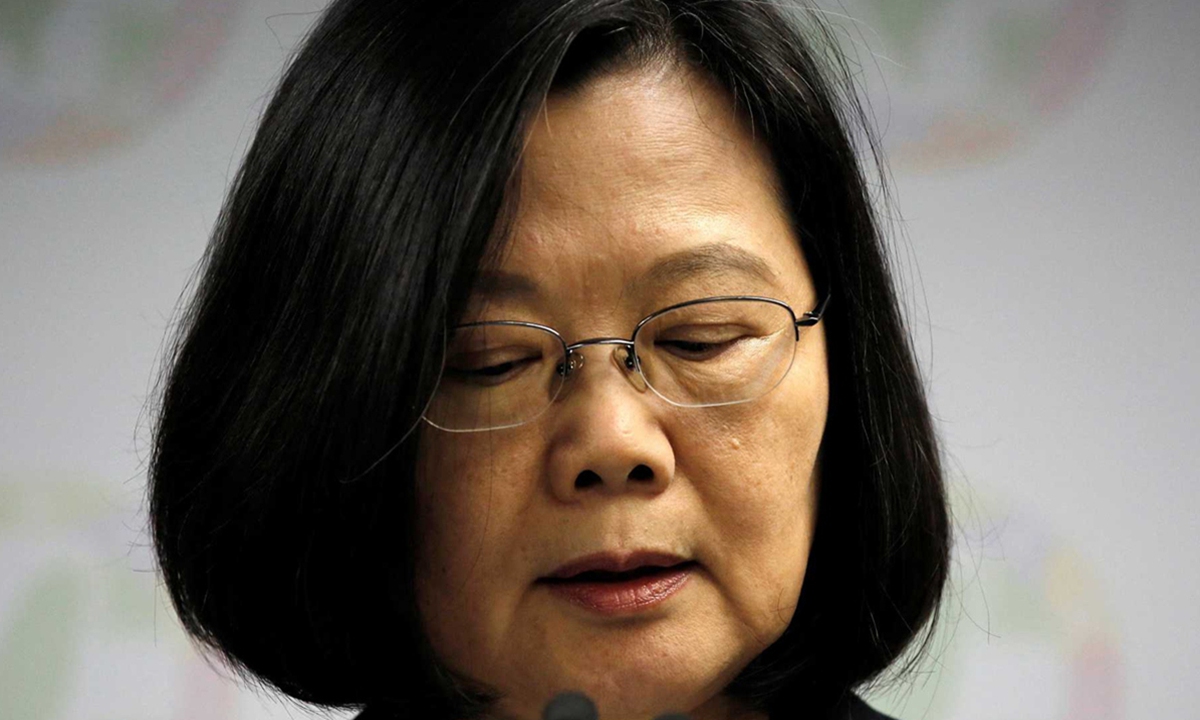
Tsai Ing-wen Photo:VCG
The results of the local elections of Taiwan region were announced on Saturday. Except for the postponed mayoral election in Chiayi city, the Kuomintang (KMT) won 13 seats among the elected 21 county and city chief posts, while the Democratic Progressive Party (DPP) won five. As a result, the population of the DPP-ruling counties and cities will be only about a quarter of the whole population on the island, and the political, economic and technological centers of the Taiwan region are no longer ruled by the DPP. This is widely considered the DPP's "worst defeat" in Taiwan's local elections in 36 years. Zhu Fenglian, a spokesperson for the State Council Taiwan Affairs Office, said the result reflects the mainstream public opinion on the island.So-called nine-in-one local elections in Taiwan refer to ones for electing county and city mayors and council members among other posts, and the KMT and the DPP have intense competition every time. The DPP has repeatedly tried to gain an advantage in the election by suppressing its opponents in shameless and despicable ways and inciting and creating some Taiwan residents' fears about the mainland for more votes. The DPP is trying to play the same old trick by characterizing the elections as "not just local elections" but the ones that will "determine what kind of message Taiwan will send to the world." However, in the end, the result is just the contrary. The island's public opinion has stated that the DPP's desperate attempt to play the card of "protecting Taiwan against the mainland" has failed. In this regard, Taiwan's local elections and results are somewhat emblematic this year.
We can see at least two points. First, the public's overall dissatisfaction with the DPP's performance in power over the past few years is on the rise. The ugly black hole exposed by Taiwan politician Lin Chih-chien's thesis plagiarism case, and the ambiguous relationship between the DPP and the underworld have all aroused dissatisfaction and disgust among the people of Taiwan. Second, the public has become more discerning about the political tricks that the DPP is good at and relies on. In other words, it is not so easy for the DPP authorities to continue their political lies on the island.
Tsai Ing-wen announced her resignation as the chair of the DPP on Saturday evening to take responsibility for the party's performance in Taiwan's local elections. She claimed that she did not move the people of Taiwan and gain their trust again. But did the DPP lose because it "did not move the people of Taiwan again"? In the six years since Tsai Ing-wen came to power, she has repeatedly relied on the US to seek "independence", refused to recognize the 1992 Consensus, vigorously pursued de-Sinicization, and promoted "Taiwan independence", which has led to increasingly tense cross-Straits relations and seriously damaged the interests of the people of Taiwan. It is no wonder that before the "nine-in-one" elections, Ma Ying-jeou said in a post, "Vote for the DPP, young people will go to the battlefield." The results of this year's Taiwan local elections show once again Taiwan people's expectations for peace and stability.
Some people think that the DPP, which has been hit hard this time, may become more radical. Given the DPP's usual political nature, this is indeed a possibility. We are here to advise and arguably remind Tsai Ing-wen and the DPP authorities not to step on the gas pedal and accelerate while running toward the cliff. It is time to step on the brakes to avoid a pulverized fate. The risk of "Taiwan independence" forces is something no secessionist force can bear, let alone control. The DPP authorities should reflect deeply on the elections' defeat and make decisions on adjusting cross-Straits policies early. Otherwise, it will only be a road that leads to a dead end.
According to the past experience of the DPP, there are a lot of topics that can be manipulated in elections this year. Nancy Pelosi's visit to Taiwan has suddenly escalated the situation in the Taiwan Straits, and the DPP authorities have stepped up their "relying on the US to seek independence" collusion activities, gradually pushing Taiwan to the brink of a fierce war. The DPP has always used or deliberately created an atmosphere of cross-Straits tension for its own political self-interest. However, things develop in the opposite direction when they become extreme. The DPP's unrestrained political manipulation has made many Taiwan people have a more intuitive understanding of the danger of "Taiwan independence" secessionists. This is beneficial to cross-Straits peace. People have seen that very few on the island support "Taiwan independence" forces.
The DPP has already started laying out its plans for the 2024 election, and there are still many variables in terms of the island's political trend. The Taiwan local elections have shown some signs, but it is far from the "end." If we really want to talk about the "end," in fact, it has already been determined: Taiwan's future lies in China's complete reunification, and the well-being of Taiwan compatriots hinges on the rejuvenation of the Chinese nation. Only when reunification is achieved as soon as possible can the interests and well-being of Taiwan compatriots and their bright future be guaranteed indestructibly. As the historical trends move forward, the process of reunification is unstoppable, and those who go against such trend will surely be drowned by the powerful current of the times.
